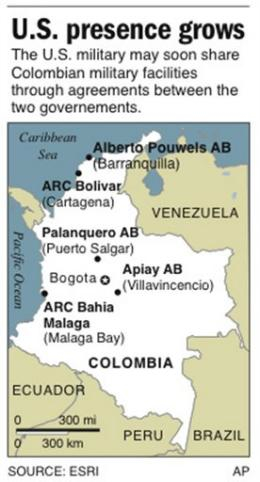 The following are some of the reasons that support the use of IT methodologies in rural schools of Colombia (especially in the school where I work):
The following are some of the reasons that support the use of IT methodologies in rural schools of Colombia (especially in the school where I work):
– When the roads linking all rural schools and their communities with the city are completely abandoned by the local administration, the World Wide Web can serve as the only way of creating new bridges between the urban and rural lives by providing students with a better understanding of their history, their present and their future perspectives.
 – With the rural school books are completely outdated, humid, worm eaten, smelly and totally unattractive to students, the best resource a rural teacher can have is the web or the software that intertwines literature to videos, images and sound. Updated encyclopedias that can only be found in the web or having special educational programs that create a more realistic learning environment. But, teachers have to be very careful when asking for those types of resources in order not to be threatened for doing so. Otherwise, they will have to buy them with their own money as many of us have done before.
– With the rural school books are completely outdated, humid, worm eaten, smelly and totally unattractive to students, the best resource a rural teacher can have is the web or the software that intertwines literature to videos, images and sound. Updated encyclopedias that can only be found in the web or having special educational programs that create a more realistic learning environment. But, teachers have to be very careful when asking for those types of resources in order not to be threatened for doing so. Otherwise, they will have to buy them with their own money as many of us have done before.
 – When students do not have the opportunity to finish their high school (10th and 11th grades) due to a lack of interest shown by the authorities in charge of education in this city, the internet allows them to discover other views for their future livelihood and careers. Teachers can help them learn how to have access to online courses or even take the “distance high school course” offered by SENA (even though everybody knows such diploma is a poor justification for governmental politics on this matter).
– When students do not have the opportunity to finish their high school (10th and 11th grades) due to a lack of interest shown by the authorities in charge of education in this city, the internet allows them to discover other views for their future livelihood and careers. Teachers can help them learn how to have access to online courses or even take the “distance high school course” offered by SENA (even though everybody knows such diploma is a poor justification for governmental politics on this matter).
 – When there are no jobs for them in rural areas of this city, that would meet their needs in terms of what is legally expected: fair wages, legal amount of working hours, all with social security services (from subsidiary to contributory), teachers can use the web to lead them to identify what their working roles in the society will be.
– When there are no jobs for them in rural areas of this city, that would meet their needs in terms of what is legally expected: fair wages, legal amount of working hours, all with social security services (from subsidiary to contributory), teachers can use the web to lead them to identify what their working roles in the society will be.
– Of course, there are other minor reasons such as entertainment or social networks that result as a short way out or a pause in their daily lives. These moments also help students to amuse themselves, laugh, play and recognize how their technological abilities enable them to reinforce their social skills.
In brief; a rural teacher must become an IT wiz given the fact that ITs represent a more realistic approach to knowledge and display a great pool of opportunities not only for students but also for teachers. We need to take full advantage of those few but good computers and weak but existent connections to internet we still have in our schools. How else could we teach them how the world is out there and show them that this world belongs to them as well?











 A strong generalized conviction in the field of education – which has been inherited
A strong generalized conviction in the field of education – which has been inherited According to Socrates the highest level of knowledge is “Self-knowledge” and the truest is “Goodness”. This explains why knowledge is always tending to reach the truth in thoughts and actions, and how it is originated intrinsically as a product of a mental process over matter.
According to Socrates the highest level of knowledge is “Self-knowledge” and the truest is “Goodness”. This explains why knowledge is always tending to reach the truth in thoughts and actions, and how it is originated intrinsically as a product of a mental process over matter.